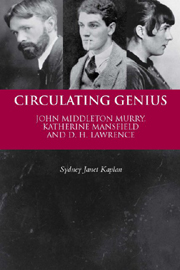Book contents
- Frontmatter
- Contents
- Acknowledgements
- Abbreviations
- Introduction
- 1 ‘My Blundering Way of Learning’: Murry's Still Life
- 2 Still Life and Women in Love
- 3 From Still Life to ‘Bliss’
- 4 ‘A Furious Bliss’
- 5 ‘With Cannonballs for Eyes’
- 6 ‘The Coming Man and Woman’
- 7 The Things We Are
- 8 Circulating Mansfield
- 9 Circulating Lawrence
- 10 Circulating Murry
- Bibliography
- Index
6 - ‘The Coming Man and Woman’
Published online by Cambridge University Press: 12 September 2012
- Frontmatter
- Contents
- Acknowledgements
- Abbreviations
- Introduction
- 1 ‘My Blundering Way of Learning’: Murry's Still Life
- 2 Still Life and Women in Love
- 3 From Still Life to ‘Bliss’
- 4 ‘A Furious Bliss’
- 5 ‘With Cannonballs for Eyes’
- 6 ‘The Coming Man and Woman’
- 7 The Things We Are
- 8 Circulating Mansfield
- 9 Circulating Lawrence
- 10 Circulating Murry
- Bibliography
- Index
Summary
‘You are evidently a genius as an editor – nothing short of that – a perfect genius’, Mansfield tells Murry on 13 October 1919, after reading through a particularly lively issue of the Athenaeum (KMCL 3: 21). Murry is equally complimentary in his response to her letter on 17 October, exclaiming that she is ‘the only genius in the whole bunch of good ones among us’ (LJMM: 187). He also magnanimously suggests she help Lawrence by writing something on Sons and Lovers, ‘saying how it stands out etc. You know what the average is like nowadays & you can speak your mind’ (LJMM: 188). In this optimistic mood, he lays out his plans for her to consider: ‘I have two determinations – one to make the paper a success against all competition this winter – the other to write a novel with among other things some real you and me love in it’. As editor, Murry is now able to control the direction of his own literary criticism without interference. He can select the books he wants to review and use them for his own purposes, especially as vehicles for his developing aesthetic principles. In fact, the Athenaeum provides the opportunity for both Murry and Mansfield to cultivate their critical talents and to articulate the theoretical bases for their critical practices. Mansfield's ‘novel page’, as Murry calls it, is ‘one of the features most appreciated in the paper’, and he believes that it is ‘quite unlike – in a different class to – anything that's being done in the way of reviewing anywhere to-day’ (LJMM: 210).
- Type
- Chapter
- Information
- Circulating GeniusJohn Middleton Murry Katherine Mansfield and D. H. Lawrence, pp. 118 - 136Publisher: Edinburgh University PressPrint publication year: 2010



